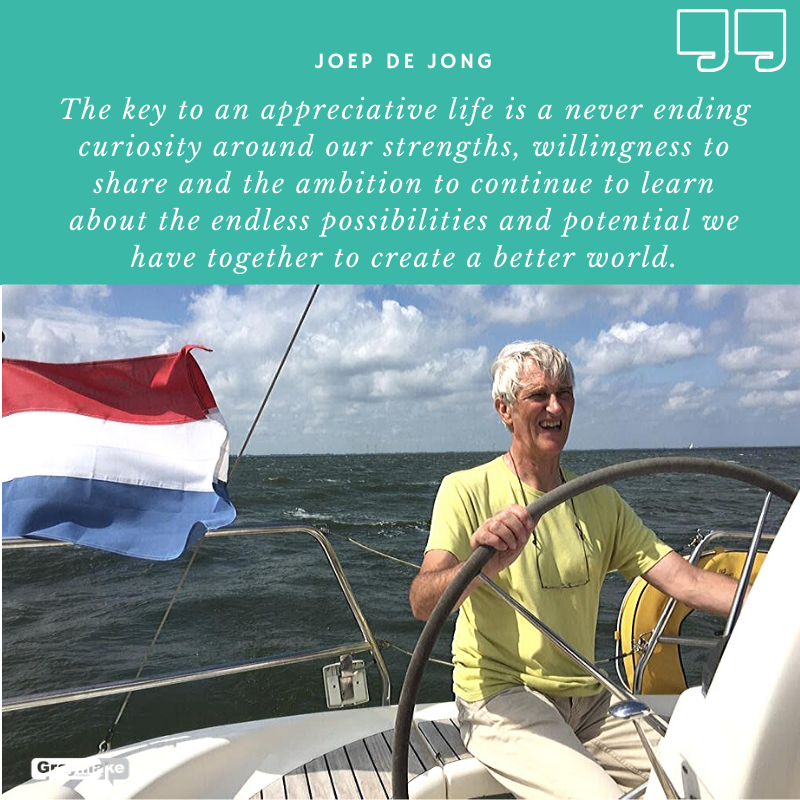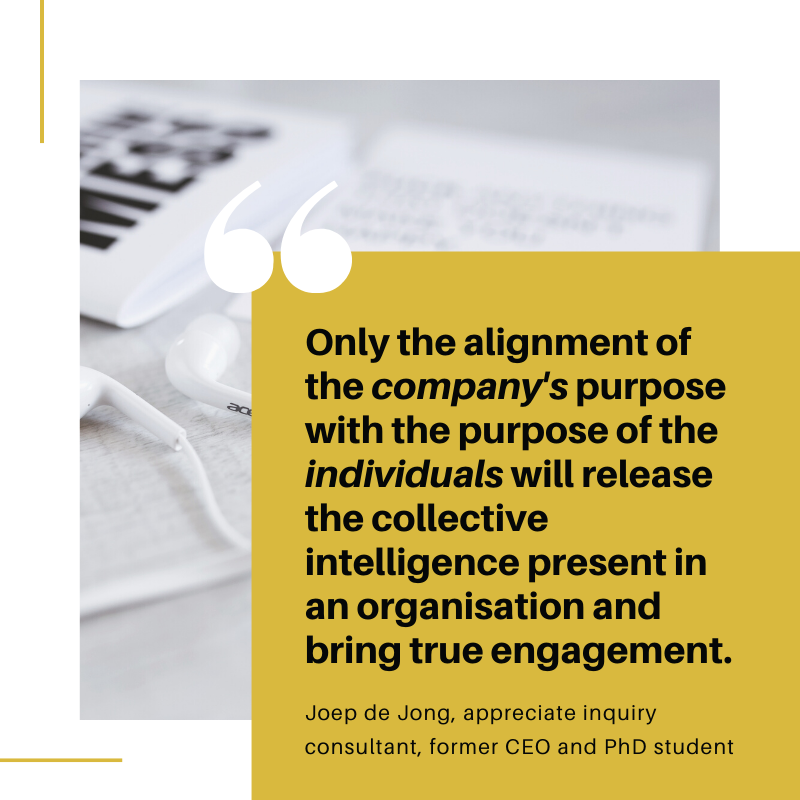JOEP DE JONG BREAKS DOWN THE KEY TO AN APPRECIATIVE LIFE
Sometimes you look into the eyes of another person and see yourself differently. This is an incredible gift.
To be seen, to be given time, powerful questions, and a hearty smile is what Joep de Jong has done for me many times over.
For me, Joep truly epitomizes what it means to possess the soul of an appreciative leader.
Joep and I met doing work together in Johannesburg, South Africa. I arrived terrified I didn’t have what it takes to be an organization development practitioner and left confident I had found my calling—largely in part to him.
When my father died, Joep again inquired deeply, listened and mostly just made the time: something so precious for a man that has many ways to spend it.
This man is brilliant and accomplished but mostly just present and loving. We should all be so lucky to live lives this rich. And perhaps if we center them on appreciation, we can.
With great appreciation for my mentor and friend, Joep de Jong and for all of you this season of gratitude!
Anne Hilb: Joep, tell us about yourself!
Joep de Jong: About myself. As a believer in the concept of Ubuntu—my take: I am because you are—I’m only somebody in relation to the world around me.
So, in short, I’m a former executive and CEO, but maybe more importantly, I’m the proud father of Maaike, Dirk and Anne, and grandfather to Ilse and Jochem. Partner of Hanne with whom I live on our houseboat in the Netherlands.
After I resigned as CEO six years ago, I started a PhD, became a consultant, lecturer, mentor and coach and started singing, dancing (tango) and filming.
AH: Joep, you are one of the world’s leaders in Appreciative Inquiry work. For those who don’t know what that is, can you explain and share how this framework has become such a meaningful aspect of your life over time?
JdJ: Appreciative Inquiry (AI) is a way of looking at our world from a perspective of what gives life when it is at its best, whereby we focus on the possibilities and the potential there always are—despite hunger, poverty, war etc.
This is rooted in the knowing that each and every one of us has powerful words, stories to share when we tap into our strengths. When we can access those stories, discover the strengths they bring to ourselves and our relationships we can change our world for the better.
After all, one of the principles supporting appreciative inquiry is social constructionism, meaning most of what we’ve created is a social construct, and if the collective intelligence of the community has a better way of doing things, we could create a new social construct—as long as we are respectful and courageous enough to do so!
AH: What do you believe is the key to living an appreciative life?
JdJ: The key to an appreciative life is a never ending curiosity around our strengths, willingness to share and the ambition to continue to learn about the endless possibilities and potential we have together to create a better world—learning to see the other and in return being seen by the other.
It also means to appreciate whatever is there, not the same as liking whatever is there, but to appreciate what it might learn us.
AH: Are there common traits in those who approach the world around them with an appreciative lens? Which of these are innate, which are cultural, and which are learned and/or cultivated?
JdJ: In October 2019, Mille Themsen Duvander presented her PhD research on how AI practitioners around the world live and grow. I think I can best quote her work as it strongly resonates with me and I was one of the participants in her research:
AI practitioners actively prioritize finding: balance in their work life, trust in a very significant way and enter states of flow when possible. They navigate via intuition and openness towards uplifted relational energy in shared processes, they take responsibility for their own healing of trauma and patterns, and they work and live from a quantum physics understanding of wholeness—which means that everything is connected (Duvander, 2019, p.1).
My 25 years of experience with appreciative inquiry has taught me that this works across the world and across cultures, as it addresses some fundamental human characteristics—like how normally human beings are open to other individuals who ask for help and how we find joy in creating and finding a better world together.
AH: How does Appreciative Inquiry shift outcomes in business?
JdJ: Appreciative Inquiry has proven that successful outcomes in businesses are achieved when it’s principles are applied and management dares to move from a ‘command and control’ structure to one of ‘trust and facilitation’.
Appreciative Inquiry, by its very nature, engages people. And when people feel engaged around the purpose of an organisation when it aligns with, links to, their own purpose in life, we see incredible long-term business results. From management and leadership, it requires that they have the courage to acknowledge that ’they don’t know’ and also believe that the community does!
As senior executive in two organisations and later CEO of another one, we proved three times that approaching challenging situations with an AI approach brings great long-term results, as it honors the triple bottom line: people, planet, profit.
AH: You are writing your thesis on the Soul of the Appreciative Leader. What major trends or discoveries have you unlocked thus far?
JdJ: The ‘discoveries‘ I’ve made so far are coming from my business experience, and they are captured in three frameworks and a series of film portraits (On leadership with …).
1) The value chain of leadership, whereby the essence is that all elements in the value chain, ranging from data to wholeness/spirituality, are valuable. We should, however, understand their place and meaning in our business processes.
2) In our world where we see an ever-increasing speed of change, we need to find a balance in our lives. In order to do so, we need the competency and skill to slow down. Managers and leaders have a large responsibility in this!
3) Only the alignment of the company’s purpose (vision and mission) with the purpose of the individuals will release the collective intelligence present in an organisation and bring true engagement!
AH: What bold question might you like to be asked that you never have been—or what is your favorite question to ask others?
JdJ: In my filming and my coaching, I’ve come to ask people the following questions more and more:
What is the gift you have been given (for your community / this world)? and How do you share your gift with your community / the world?
They come from my motto: “The purpose of life is to find your gift; the meaning of life is to be found in sharing your gift.”
I guess one of the boldest ways of working with others is to let the question(s) emerge. For example, in my filming, I just sit in front of the other person in silence and a question will emerge. I sometimes say: Can you hear the question that arises from the silence within you? And I love when people ask me that question—however challenging it may be to become quiet and hear and experience the silence!
AH: Anything else you would like to share?
JdJ: Nothing other then to thank Anne and the people that inspire and challenge me to continue to travel this path. For this interview in particular, I would like to mention my (grand)children, Hanne, Dan, David, Lindsey, Pru, Mille and Vera. They see me, love me, they inspire and challenge me and, without them, I would not be who I am.




